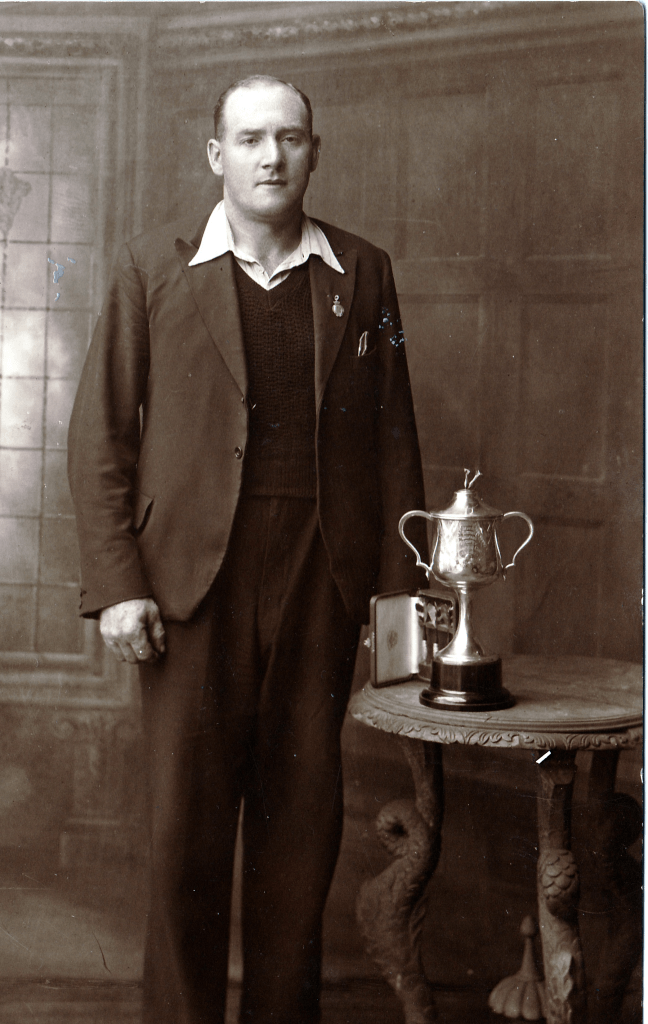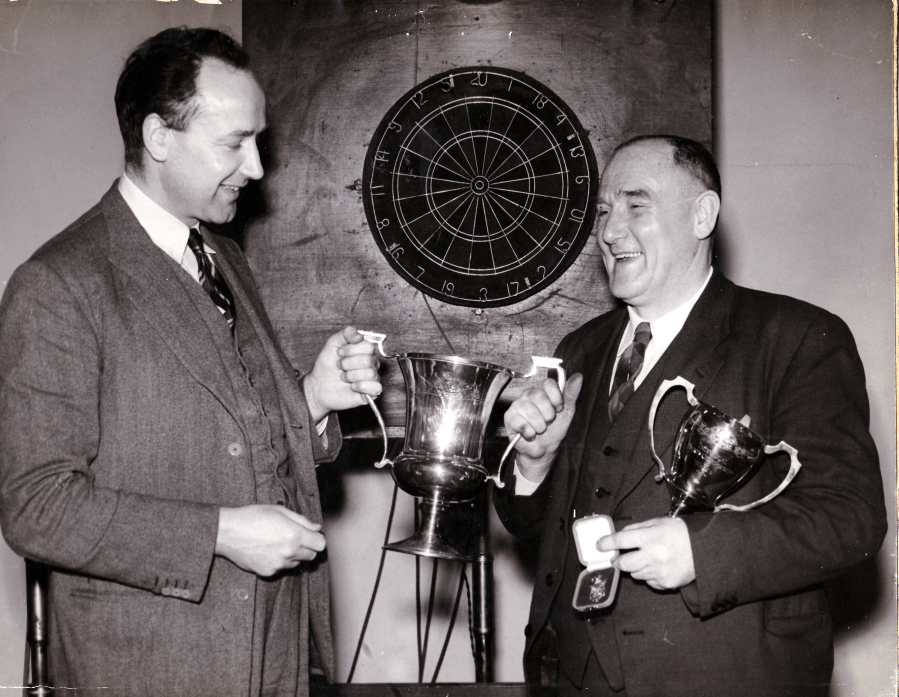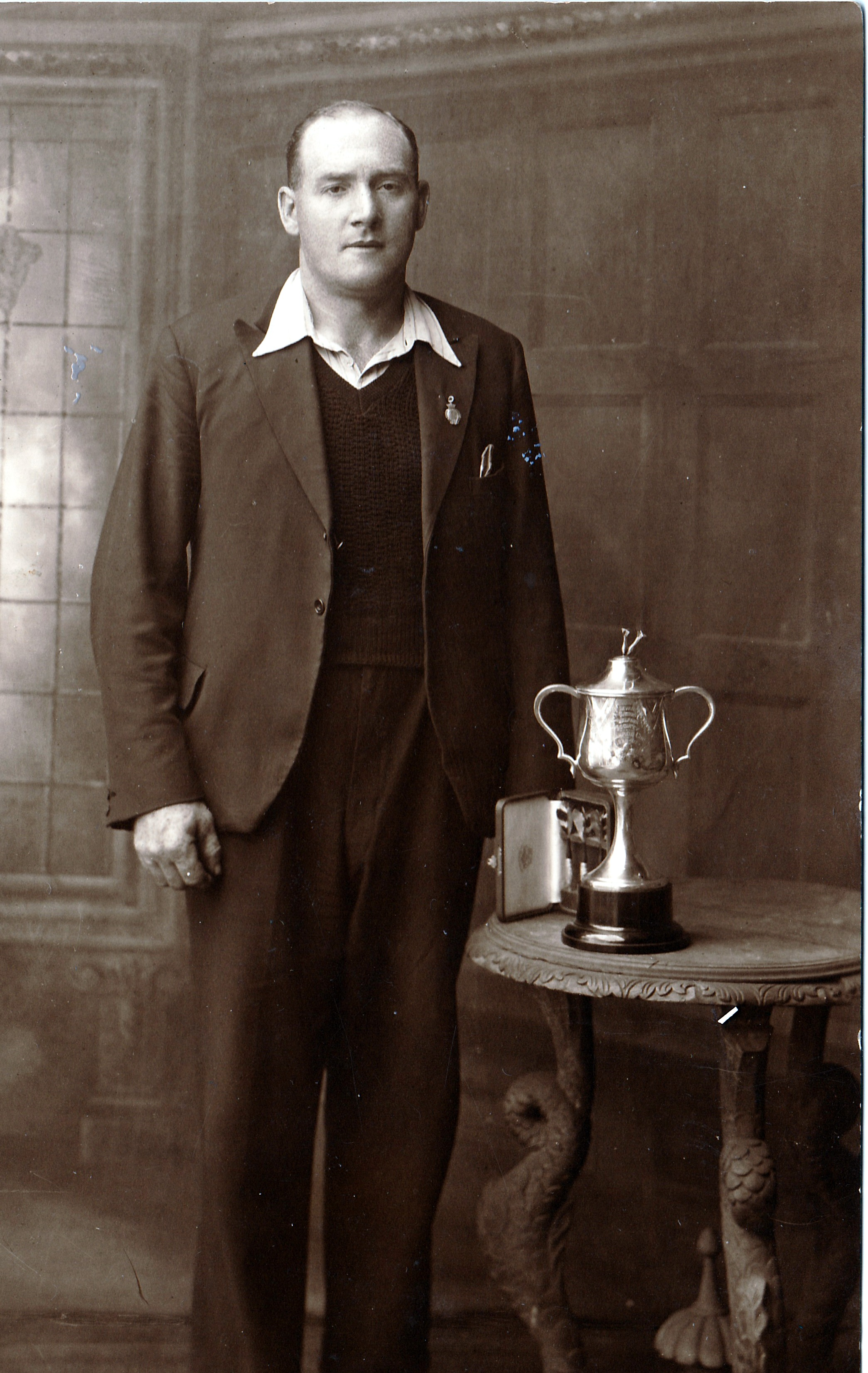Despite Wales sending Divisional champions to London for the Grand Finals of the News of the World every year since the competition was restored after the Second World War in the 1947/48 season, the country had to wait until 1954 until the trophy was lifted by a Welsh champion, Oliver James.
This is Oliver’s story.
In an article written by journalist Barry Walsh in the early 1960s titled ‘Oliver James – Darts Champion Supreme’ culled from an unnamed Welsh newspaper, Walsh’s opening gambit read:
Pandemonium broke out in Earls Court, London, on an evening in 1954, when 6,000 wildly excited darts enthusiasts, – many of whom travelled up from the Dulais Valley – saw a 52-years-old Seven Sisters grandfather, Oliver James, beat the cream players of the country to become the first Welshman to win the much coveted “News Of The World” individual darts championship of England and Wales. A magnificent record coupled with another, for Oliver still holds the record of being the oldest ever player to win the national title…
Oliver, by then 61-years old, was interviewed because of the fact that ‘Wales’s only British darts champion’ had been made an honorary member of the team he had played for in recent years – the “Coalites” of the Half Way Inn, Onllwyn. In a letter notifying him of this honour, team captain and secretary Ray Venn wrote, ‘We will always admire and cherish the name of Oliver James.’
Oliver James (pictured below) was born in the town of Pembroke on 1st March 1902, son of the town crier. At the age of 15, Oliver went out into the wide world but soon settled at Nantymoel in the Ogmore Valley where he became a collier and eventually moved to Seven Sisters. As a youngster he took an interest in indoor sports and gained success as an exponent of table tennis, billiards and table quoits. In spite of his useful ability at these games, Oliver treated them ‘merely as a pastimes.’

He was introduced to darts in 1937 and played for ‘Hoopers Shop’ in the Dulais Valley Shoppers League, the original darts league in the valley. League Officials applied to the local Welfare association asking them to present a shield for individual competition in the league and this was agreed. Oliver subsequently won that trophy three times and earned success with the “Hoopers shop” team of Martyn’s Avenue, Seven Sisters, which included such local stars as Stan Jones (‘The Milk’) and Syd Williams (‘The Ostler). Despite these successes the league eventually disbanded.
During his interview with Barry Walsh, Oliver James said, “Darts was growing far more popular by now and was being introduced into public houses [rather than just clubs].” With his other team disbanded, Oliver joined the team at the Ex-Servicemen’s Club, at Dyffryn Cellwen, Onllwyn, competing in the Club Institute Union (CIU) League. Oliver said, “It was the best team and league I have ever played in.” It was while playing for the club that he won his News of the World title.
A fixed pattern of afternoon shifts working down the mine, meant that Oliver was unable to enter even the preliminary rounds of the News of the World until 1952. Even then his first attempt at the News of the World title in the 1952/53 season ended abruptly when he was beaten in one of the preliminary rounds by Len Heath, a teammate at the Ex-Servicemen’s Club. However, Oliver did not have to wait long for success.
At the start of the 1953/54 season, armed with his ‘bombers’, heavy-weighted brass darts he had always used, darts he had specially filed down for better grip, Oliver won through the News of the World preliminary rounds. From there he travelled to Cardiff where he won the Wales divisional title, being presented with a magnificent trophy by former international and Captain of the Glamorgan County Cricket Club, Wilfred Wooller. (See image. Oliver James is on the right.)
The news that Oliver had made it through to the News of the World finals at the Empress Hall, Earl’s Court, London, spread like wildfire throughout the Dulais Valley and his supporters set about organising their trek to the capital.

Barry Walsh’s report revealed that, as it was holiday time, an unassuming Oliver, ‘in his usual cool and calculative manner,’ decided to make his visit to London serve a dual purpose. On his way to the finals he travelled to Gillingham, Kent to visit his son, daughter-in-law and two grandchildren, for a brief holiday before the big day.
While Oliver was relaxing with his family, panic-stricken organisers visited Oliver’s home to find it empty. Frantic telegrams and telephone calls (no mobile phones in those days) were made to try and track him down. At the last moment they discovered where he was. Oliver told Barry Walsh, “A report appeared in a paper that I was missing, but I got to London in plenty of time.”
According to Walsh’s report, Oliver’s nerves were unshaken by a crowded Earl’s Court, and the ‘6,000-plus baying fans.’ He was confident from the outset. Walsh reported that Oliver’s band of Dulais Valley supporters, ‘in a state of nail-biting tension, watched in silence as he took on Peter Aldridge, the London and Home Counties champion, in the quarter final. On his first visit to the board he notched up a good ton and finally defeated Aldridge by two legs to one.’
In the semi-finals, Oliver came up against Alec Adamson, the North of England champion. Unperturbed and with frequent tons and 140’s, the Welsh champion strode through to the finals by two straight legs. Afterwards, Oliver learned that he would be meeting the Eastern Counties champion Johnny Bell, representing the Sun Inn, Waltham Abbey, Essex, in the final, a man regarded as the ‘dark horse’ of the grand finals.
‘Dark horse’ or not, Oliver remained calm and unruffled and threw consistently well, comfortably winning the first leg against Bell. However, the second leg was a different story. Bell hit form, striking four consecutive tons but, again, Oliver seemed unperturbed and battled on. Oliver told Barry Walsh, “The Eastern champion left himself on double 18 while I wanted 224. But Bell had cracked, he had shot his bolt.”
Within another three darts, after Bell had ‘wire trouble,’ his darts hugging the wire of double 18, Oliver, scoring 99, reduced his remaining score to 125. Johnny Bell’s next three darts again struck outside his required double. With tension running high, Oliver strode up to the oche, pinned his first dart in the treble 20 (60), embedded his second in the outer bull (25) and narrowly missed the match-winning double top. Sensing that he must put that double away, Bell pinned the first two darts of his next throw close to the wire and then hit a single 18 with the third.
By now the tension by was unbearable. Oliver told Walsh that you could have heard a pin-drop in the Empress Hall. Oliver moved up to the hockey (as it was spelt in those days) and, with his first dart, hit the winning double top. Pandemonium broke out throughout the Hall as a delighted Oliver, his cool temperament discarded, jumped on his opponent’s back!
Oliver James was presented with the magnificent silver cup by the famous air ace Douglas Bader who was, at the time, Air Correspondent to the News of the World. After witnessing the final Bader was quoted as saying, “I have never been to a darts competition before but at times I was simply trembling with excitement.” Afterwards Oliver James was chaired from the vast arena by his jubilant band of supporters.

After winning the national crown, Oliver’s feat was recognised locally when he was presented with a silver lighter by the Neath Sports Club panel, a gold watch by the Ex-Servicemen’s Club and a silver cup by Councillor Lal Evans, who at the time was president of the club and was among Oliver’s supporters at Earl’s Court.
Although he never again made it to the News of the World finals, Oliver went on to earn more trophies at a local level and in 1961, with the ‘Coalites,’ (the Welsh county and area champions) made it as far as the finals of The People Lord Lonsdale Darts Team National Championship in London. However, the team failed to win that trophy.
In his report in the early 1960s, Barry Walsh stated that, ‘Oliver still enjoys playing the game. His three sons also play… Mrs James, who has little interest in the game, remarked humorously, “I suppose I have been a darts widow.”
Oliver James died following a heart attack on 10th August 1971.
Patrick Chaplin
Original text ©2014 Patrick Chaplin. Images from the PC Archive or as sourced.
(My thanks to Oliver’s great-grandson Simon for providing much of the information and some of the images included in this article.)
